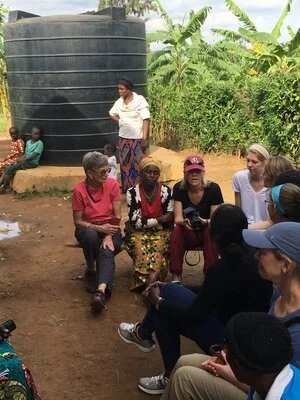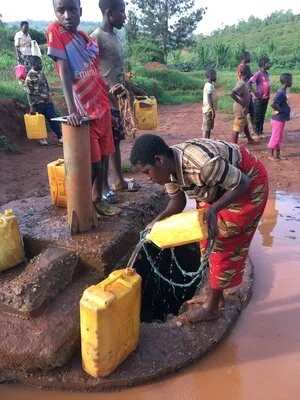Team Hard Workers
A Success Story of Powerful Women Change Agents
In a rural community called Gahanga on the outskirts of mountainous Kigali, you will find team Hard Workers. This team of 19 women, including their leader Seraphine Hacimana, were particularly troubled by their long daily journey to collect water. Rwanda is a spectacular, mountainous country, and in Gahanga, like many parts of Rwanda, women rarely have easy access to water, so they must walk 3-4 miles /5 - 6.5 km down a hillside to collect water at a dirty valley creek. In addition to the disease and poor hygiene associated with inadequate water access, many of those who were left physically disabled by the war and those who are elderly, blind, pregnant, or HIV positive are too weak to make this journey. In this area, a service has sprung up where local men agree to deliver water on bicycles for a fee. But if a woman cannot afford to pay, as one explained, "your children are coming home from school for lunch, and you have no water to cook them rice and beans. And so, you do what you have to do." Many women end up having to exchange sex for water delivery just to feed their children.
Seraphine and her team were accepted to the Academy for Conscious Social Change. With the Academy training and an initial $2600 seed grant, they designed their own non-profit water solution. They installed a water tank next to a church within close walking distance of their remote community to collect and purify rainwater from the roof during the rainy season. In the dry season, they pay for clean water delivered by truck from the city. Hard Workers launched their operations in August 2007 to serve 100 households (800 – 1000 people) with fresh, clean water daily. The revenue generated by those who can afford to pay ensures the most vulnerable always have water for free.
Further, the team uses any profits to pay orphan school fees and provide annual health insurance for vulnerable women and their families. As of its sixteenth year, the project was operating sustainably and completed an expansion project to three additional sites, now serving a total of 12,272 people, protecting even more women from sexual exploitation. The team members, some even widows in their 70s, sleep side-by-side in shifts each night to protect their tanks from people stealing their water. The venture has become so valuable to the community that even some village men have asked to join the project, and occasionally, when a woman is sick, their husbands will take their shift guarding the tanks at night.
These women have become established leaders in their community and have begun to make a significant difference in a critical issue facing vulnerable women. Women from as far as three hours away have walked to visit and witness the team's success.
Project leader Seraphine has spoken on the radio about water issues, was invited to Kenya to share their solution, and is now seen as the first to bring development to their remote community. But what is most remarkable about this team is that of its 19 members, only 7 are formally educated. Seraphine is a mother of 8 children in her 40s with only a 1st-grade education. Once living on the edge of survival, Seraphine is now a community change leader.



